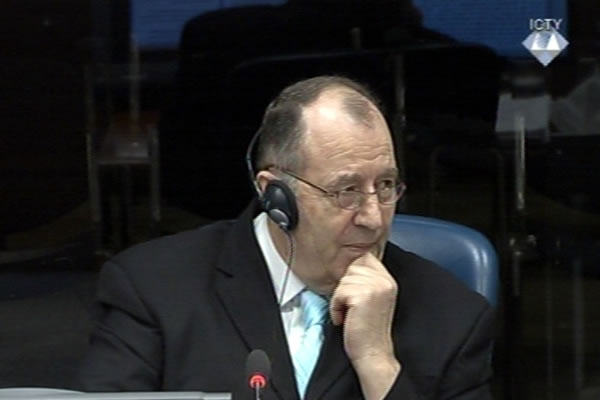Home
IF BOSNIAN SERB POLICE HAD BEEN PART OF INTERPOL…
In his evidence in Karadzic’s defense, former Bosnian Serb police minister Mico Stanisic claimed that in wartime, when conditions ‘went beyond the worst’, the ‘detection rate’ in crimes against non-Serbs in 1992 was ‘satisfactory’. It would have been even better if his police force had been a member of Interpol, because then it would have had access to the statements given by the witnesses to the BH police
 Mico Stanisic, witness at the Radovan Karadzic trial
Mico Stanisic, witness at the Radovan Karadzic trial Former Bosnian Serb interior minister Mico Stanisic was sentenced to 22 years for the crimes in BH in 1992; the crimes were part of a joint criminal enterprise aimed at a permanent expulsion of Muslims and Croats from the territory that was to become the Serb state. In his evidence in Radovan Karadzic’s defense, Stanisic strove hard to convince Judge Kwon’s Trial Chamber that the exact opposite was the case. According to Stanisic, the police did not commit any crimes. Indeed, the police, acting on his orders, diligently investigated those crimes and pursued the perpetrators regardless of their nationality. Stanisic argued that he and the accused didn’t share in the plan to commit crimes. On the contrary, Karadzic and he carried out ‘compatible’ actions to prevent them.
Although he was appointed minister in March 1992, Stanisic learned about the crimes against the non-Serbs in Brcko, Zvornik, Bijeljina, Rogatica and Rudo only on 11 July 1992 at a police collegium meeting in Belgrade. According to Stanisic, the paramilitary units, mostly from Serbia, were responsible for the crimes. They were motivated by ‘greed’, but in their pursuit of this goal, they committed other crimes against Muslims and Croats. As for Stanisic, he actually dispatched police units to those towns to deal with the paramilitary groups in cooperation with the federal police personnel. Stanisic couldn’t remember how many criminals were arrested in the action. The criminals were mostly prosecuted in Serbia, both because they had come from Serbia and because the Bosnian Serb justice system hadn’t yet been established.
The witness complained that it was difficult to do police work. The MUP moved headquarters several times in 1992, the communications were bad and many police officers had been sent to the front. In short, working conditions were ‘beyond the worst’ and ‘unprecedented’. ‘Solidarity among the criminals’ was also a problem, as was the fact that the police didn’t have access to witnesses, who often fled to the territory outside the Serb control. As Stanisic explained, those witnesses gave statements to the BH MUP investigators. Since the Bosnian Serb police force was not a member of Interpol, they couldn’t gain access to the statements, Stanisic said.
In addition to those very real problems, Stanisic noted that some people in the authorities obstructed the police. According to him, Biljana Plavsic made it hard for the police to do their job when she invited ‘Cossacks, Arkan and Draskovic’ to send their units to Bosnia. Those units were full of criminals posing as special forces. On their arrival, they joined the army, grabbed the best weapons and then went rogue to commit crimes. Under such circumstances the police were often unable to identify and arrest the perpetrators. As Stanisic noted, the ‘crime detection rate was nevertheless satisfactory in comparison with the rest of the world’.
A police document produced after Stanisic left his post, in late 1992, states that the Bosnian Serb MUP conducted 8,000 crime scene investigations, 2,500 expert analyses and 23,000 interviews. The witness admitted that because it was wartime these efforts often did not result in the culprits being charged and tried. The evidence was nevertheless used in the trials conducted after the war, Stanisic added.
Although many former police officers have been convicted of the crimes in prison camps throughout Republika Srpska either by the Tribunal in The Hague or the state court in Sarajevo, Stanisic stubbornly denied the police were to blame, claiming that he had insisted on the lawful treatment of the prisoners. To corroborate the claim, Stanisic’s orders to ‘prevent abuse’, issued in August 1992, were shown in court. By that time, most of the killings and maltreatment in the prison camps had already been committed and the reports of those crimes had been broadcast globally.
Although the initial plan was to admit Stanisic’s statement into evidence in the form of a deposition, and then to allow the prosecution to cross-examine him live, in the end he was examined in chief live, too. His lawyer had asked that his statement to the defense be admitted into evidence in such a way that no part of it could be used against him in the appellate proceedings, or alternatively, in any other trial for war crimes before any other court. This motion was rejected. The witness was thus allowed not to answer any potentially incriminating questions, in line with the Tribunal’s rules. The Trial Chamber can compel him to answer, but the answers cannot later be used against him.
Linked Reports
- Case : Karadzic
- 2014-01-30 INCIDENT IN HAMBARINE – CAUSE OR PRETEXT FOR CRIMES?
- 2014-01-30 WITNESS DOESN’T KNOW WHO KILLED VILLAGERS, BUT KNOWS THEY ‘RAN AMOK’
- 2014-01-29 KARADZIC WAS TOO TOLERANT
- 2014-02-04 INVESTIGATION THAT COST WITNESS HIS JOB
- 2014-02-05 POLICE FIRST ARMED CRIMINALS THEN HAD TO FIGHT THEM
- 2014-02-06 JOURNALIST RENOUNCES HIS WARTIME TEXTS
